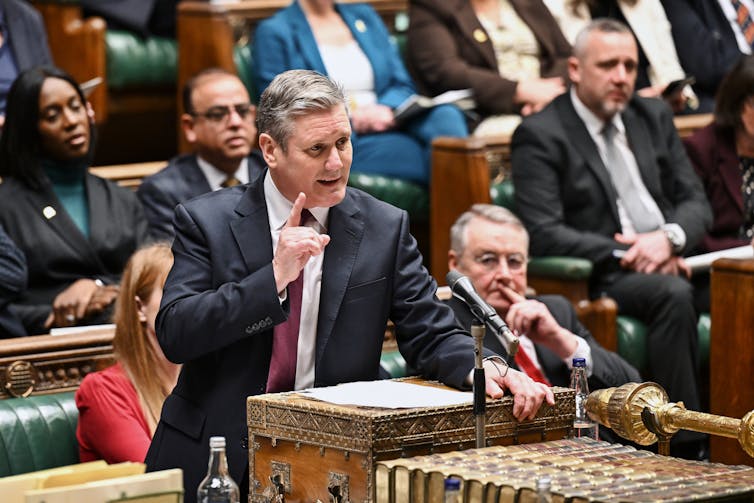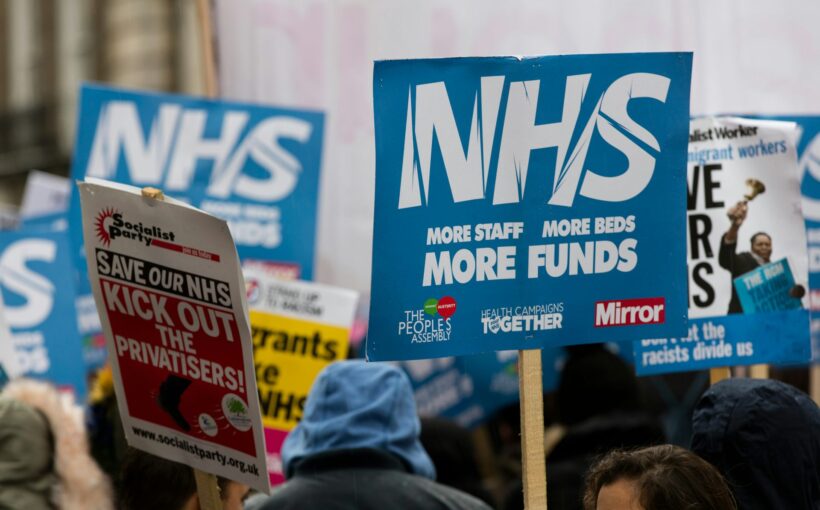
Keir Starmer’s Labour party has won the UK general election in a landslide. Its huge majority should, in theory, give Starmer the clout to see through most of his political agenda. But in reality, the victory celebrations might prove short-lived, given the size of the challenges in front of him.
When Tony Blair came to power in 1997, he inherited a strong economy and a tide of booming national optimism. Starmer, by contrast, inherits an economy in the doldrums and a mandate seemingly more motivated by a desire to remove the Conservatives than by enthusiasm for Labour’s manifesto.
The new cabinet will be faced with an array of problems demanding immediate attention. What one senior Labour official has reportedly dubbed Sue Grey’s “shit list” spans multiple government departments, from education to justice to infrastructure. Looking at these problems in turn, we might ask: is the party over before it’s even begun?

1. Thames Water
The UK’s largest water company is in a deep financial hole, with more than £18 billion of debt, evaporating investment, and a long-running standoff between shareholders and the industry regulator, Ofwat, over the paying of dividends. This, combined with the considerable investment required to overhaul Thames Water’s creaking infrastructure, has put the company on the brink of collapse.
Ofwat is expected to publish its plan for the water industry on July 15, less than two weeks into the new government’s first term. The regulator is expected to rule out allowing Thames Water to raise bills as it had planned to. If so, or if Ofwat insists that infrastructure pledges be met, then Starmer might well have to consider an expensive nationalisation of this water company.
2. Overcrowding in prisons
According to the Prison Governors’ Association (PGA), prisons in England and Wales are 99% full. With knock-on effects for the court system’s ability to hear cases and pass sentencing, the PGA warns that “the entire criminal justice system stands on the precipice of failure”.
Labour has promised to reform the planning system so prisons are designated as sites of national importance, meaning it can build more of them. However, it will still take years to yield the 20,000 extra jail places Labour has pledged. And even if this does happen, there is no clear consensus that simply increasing capacity will solve all the problems, without similarly resourcing the rehabilitative arm of the Prison Service.
The obvious solution to creating more capacity in the short term is early releases. This can include prisoners nearing the end of their sentences and those who are deemed of low risk to the public. Currently, judges are also being asked to consider their sentencing options.
3. Public sector pay negotiations
Given Labour’s historical links with the major public sector trade unions, including Unite and Unison, public sector workers may be hoping that the new government will counter 14 years of pay stagnation under the Conservatives.
However, early on in the election cycle, it became clear that some unions were not happy with Labour’s manifesto. Unite refused to endorse it and the new chancellor, Rachel Reeves, has made no effort to suggest money will flow more freely while she heads up the Treasury.
With inflationary pressures easing and interest rates predicted to fall by late summer, some will argue that the case for pay rises is dissipating. Yet for others, lack of action on pay will be an admission that Britain’s standard of living has slipped permanently.
4. Universities going under
The financial crisis in England’s universities has long been brewing. Many are faced with a precipitous collapse in overseas student numbers and an accompanying loss of income – a problem compounded by their overall operating loss when providing for home students.
Home tuition fees have barely risen since the £9,000 fee was introduced in 2012 – while in real terms they have dropped by a third. The £9,250 universities now receive for each home student compares badly with the actual cost for teaching a student, which is calculated at £12,000.
Many universities are wrestling with high interest rates and a slowdown in the property market, making loans taken out on capital investments increasingly difficult to pay. Some politicians have called for domestic tuition fees to be raised. However, as Nick Clegg and the Lib Dems can attest, tuition fees are one of the “third rails” of British politics – touch it and you die.
Starmer is left with only two realistic options: get rid of the limits on international student numbers, or significantly revisit the way universities are funded – but again, this would require throwing money at the problem. As with other aspects of its manifesto, Labour has been vague on its proposals for higher education, perhaps in an attempt to leave all options on the table.
5. NHS funding shortfall
The health service currently has a budget shortfall of £12 billion. This reflects multiple challenges – from treatments getting more expensive and crumbling infrastructure to ballooning waiting times and disputes over pay.
Although Labour has seemingly recognised that funding is important, its manifesto refused to put a number on how much it would commit. Instead, the pledges were accompanied by promises of modernisation and reform to improve the service. The Institute for Fiscal Studies estimates Labour’s pledges to be worth £1.8 billion – way short of the required amount.
The state of the NHS is a constant litmus test for any government, so addressing this will always be a top priority. However, with meagre public finances, it might be easier said than done.
6. Failing local councils
Local authorities in England have been among the worst affected by the Conservative programme of austerity. Eight have declared effective bankruptcy since 2018, and one in five say they could follow suit without intervention from central government.
So far Labour, like the other parties, has not said how it plans to address this, but Starmer cannot afford not to. The more councils go bankrupt, the more people will struggle to access the basic everyday systems they rely on, which are funded by local government.
As with universities, there is a strong case here for reform. English local government is among the most centralised in the western world, with tight restrictions on financing and budgets.
Ultimately, the UK is in an economic rut and many of the things that might get the country out of it require one thing: money. Starmer has pledged fiscal discipline while also eschewing a return to austerity. There are clear contradictions to this approach which mean that at the minute, the sums don’t add up.
![]()
Alex Nurse does not work for, consult, own shares in or receive funding from any company or organisation that would benefit from this article, and has disclosed no relevant affiliations beyond their academic appointment.



